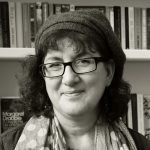
Ever thought you'd like to run a local literary event? Indie festivals are challenging the celebrity-author festival model and proving hugely popular with authors and readers. Debbie Young, the organizer of a local village festival offers top tips on how (and why) to organize your own — and do it your way.
Click here to find out more about Debbie Young
There are many reasons to found a local literature festival, and although many such events are springing up all over the place these days, each one is likely to have a different and personal history and a unique model. I'm here to share a case study of the Hawkesbury Upton Literature Festival (HULF), a successful small indie festival I founded three years ago, to inspire and encourage others to create their own. I'll be writing a more detailed account in a book in due course, but this post should give you a good idea of how it came together, why it worked, and why, three years on from its foundation, it's now a regular and much-loved highlight of my local community's social calendar.
In this post I'm going to tell you:
- the many reasons to found an indie festival
- why I founded mine
- practical tips to run a successful festival, including program planning, booking authors, satisfying the audience, keeping the momentum going, building an audience, and financial management
- why all the hard work has been worthwhile
If you have any questions, I'll be happy to help you as much as I can.
But first, a little background, so you know where I'm coming from…
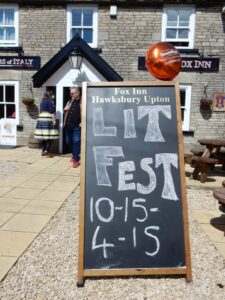
It all started at the village pub… (Photo Joanna Penn)
Hawkesbury Upton Literature Festival – The Background
As well as being an indie author, I used to work for the national British children's reading charity Readathon, which encourages children and young people to embrace a love of reading, because a habit of reading for pleasure is proven to have enormous impact on an individual's success in life, not just academically or career-wise, but also in terms of personal relationships and social life.
While working for Readathon, I learned about World Book Night, which takes place on UNESCO's International Day of the Book (23 April), and which aims to do something similar for adults, too many of whom abandon reading as they grow up, and so miss out on its many benefits and comforts.
Living in a relatively isolated village in the south west of England with no bookshop or library, I wanted to create a World Book Night (WBN) celebration for this close-knit and lively community of about 1500 people. In keeping with the theme of WBN, I wanted it to be accessible and appealing to all social groups (our village has a cross-section from poor people living on benefits to millionaires), and also not to be offputting to those who aren't already regular readers.
At the same time, I wanted to offer new opportunities for indie authors to take centre stage in a litfest setting – something that I knew was generally denied to them from having co-authored ALLi's guidebook Opening Up to Indie Authors.
I therefore set it up as a night in one of our two village pubs, with free admission, and a lively, fast-moving programme of talks and readings by indie authors that I already knew.
Unlike commercial festivals, it would not focus on any individual author (or their publisher's PR plans), but would hone in what made readers tick.
I was in the privileged position of knowing a lot of indie authors, through ALLi and other connections, and it was relatively easy to persuade them to come and spend an evening in the local pub's skittle alley – a long thin room with capacity for about a hundred people – chatting informally on various topics and doing readings from their books. I explained to them that my model of the free festival meant there was no budget for a fee, but they were happy to come as volunteers – including ALLi's own Orna Ross and a local bestselling trade-published novelist Katie Fforde – to show their support for such an innovative concept. (From the second festival onwards, Joanna Penn and Dan Holloway also became HULF authors. That it's capable of attracting such high calibre authors speaks volumes about the appeal of an indie event like this.)
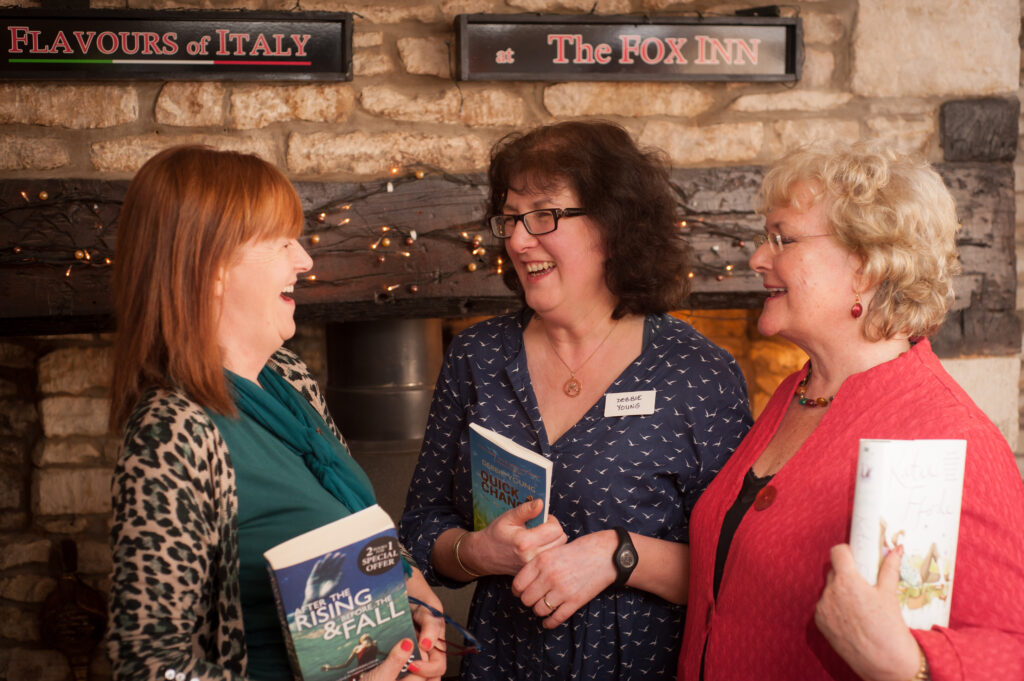
Having fun with Orna Ross and Katie Fforde at the inaugural HULF (Photo: Clint Randall)
For those who had never shared their work in public before or who had been unable to secure a booking from any other festival, they welcomed the chance to add “as featured at Hawkesbury Upton Literature Festival” to their writers' CV.
My village has an effective grapevine for publicising local events, and it's all pretty low-budget and low-tech – notices in the monthly parish magazine, posters in the village shop and on every telegraph pole in the village – but I also set up a website and shared it on social media.
I recruited a couple of locals to help marshall people, hired a photographer friend to capture it for posterity using a grant I'd successfully applied for from our nearest supermarket with a community action policy, blagged free photocopying for programmes, and benefited from a small grant for refreshments from our local writers' group (of which I'm a member), which farms its profits from its self-published books about the village history into community causes.
To cut to the chase, the net results were:
- a packed house with standing room only
- happy authors who were keen to come again to any future such events
- a terrific buzz about it in the village for weeks afterwards
- village pride in having its own litfest (it helped that I'd included the village name in the festival's title, despite it becoming a bit of a mouthful!)
- before the evening was over, me being pressured to make it an annual event
- heartening new connections between authors and readers (“It was great to meet so many authors we' never heard of,” one villager told me!)
Clearly I'd struck a successful formula and the germ of an event that could grow as large as I cared to make it.
That year WBN had fallen on a Thursday so I'd made it an evening, after-work event. The following year it was a Saturday, so I added a children's tent with activities and “meet the children's author” sessions, and made it a day long event. We added a second venue for the readings (which had been in a noisy room in the pub and its garden the first time around), and a cafe staffed by volunteers to raise more funds. This year, we chose the Saturday again, and added a third venue for the talks, with better acoustics and more space. At the opening event, there was standing room only, with an audience that had come not only from the local area but many miles further afield. One guest Sukhi Jutla, even came from London (two hours drive away) and said she'd come again next year as she enjoyed it so much. (You can read Sukhi's review on her blog here – she took some great photos too!)
This year, the audience were pressing me to turn it into a two or three day event, which would be the natural next step, but I'm not ready to make that commitment just yet, and also don't want to dilute the buzz. It would also change the nature of the event, requiring the formation of a committee, regular meetings year-round, and an even larger amount of work for me that would be too distracting from my own writing.
The only audience complaint? “I want to go to everything – there's just too much choice!” Which I reckon is a good problem to have!
Yes, it's a lot of work and a big responsibility, and I'm exhausted for weeks before and afterwards, but it's one of my proudest achievements, and having seen so many fruitful new relationships built between authors and readers, it's one I'm happy to repeat year after year.
Other Reasons to Run a Festival
The reasons I set up my festival were clearly related to my personal circumstances, but there are plenty of other reasons, including:
- to raise your own profile as an indie author and reach more readers
- to build your own network with other local authors to mutual benefit
- to provide an alternative to other festivals which do not admit indies
- to create an event at which you have licence to create your own rules
- to demonstrate to other parts of the book trade locally – libraries, bookstores – that indie authors can be a real draw for local audiences
- to give yourself a real confidence boost as an author
- for fun – and believe me, it is enormous fun
My festival, my rules! And as Dan Holloway (and HULF author for the last two years) said after this year's festival, “It's amazing what can be achieved when you break the rules”.
Clearly I could talk about HULF all day and all night, but if you want to find out more about it, you can check out its website: www.hulitfest.com.
Now on to some practical tips, in bullet point form to make them easier to digest and handy as a checklist…
How to Set Up and Run an Indie Lit Fest
Timing
- tie your event to another high-profile bookish date, it will help people remember it and give you a useful news angle
- pick a time of day to suit your audience – e.g. if you want kids, it'll need to be a weekend or school holiday
- try to keep your first one short and action-packed rather than spread things out too thinly or people will drift away
- hold more than one session at a time if you can, to keep the audience there for the whole festival (I have readings and talks running in parallel all day, each starting on the hour, every hour)
- keep readings short – three minutes is ideal – so you can pack in more authors and sustain a varied programme
Program Planning
- Think about what might interest your audience and plan around that rather than around what the authors might choose!
- On the other hand, some of the Festival authors – the more experienced ones – have come up with terrific ideas for talks themselves
- Choose general themes that allow you to have several authors speak in one session e.g. “How many words does a story really need?” for a discussion among novelists and short story writers; “Is it better to write about kings or commoners?” uniting historical novelists writing about many different eras
- Have a balance of fiction and non-fiction, poetry and prose, adults' and childrens' books
- Get feedback after each festival from authors and audience to help you fine-tune the next one
- Welcome audience participation – I've just introduced a “Poetry Please” session for audience to bring their favourite poems along to read, and we also have free writing workshops.
- Allow time for Q&A at the end of each session. It was wonderful to see how involved the audience felt in our panels this year – sometimes the talks felt like conversations around the room, the audience was so engaged. People also commented afterwards that they loved how approachable the authors were, allowing them the kind of interaction they could never have at a big festival. (We live in easy reach of Cheltenham, Bath and Hay-on-Wye Festivals, three of the biggest in the UK, so many in our audience could make comparisons.)
- Even if you can't pay your authors, there are great ways to reward them: free refreshments (cafe takings cover our costs), set up a bookshop for them to sign and sell books, give them prestigious badges (“I'm a HULF Author – Ask me about my book!”), give them as much PR as you can before and after, and big them p in front of the audience at every opportunity
- Don't try to squeeze too many authors in so that everyone there gets a fair chance to be heard
- Engage trustworthy and efficient volunteer chairs for your talks to keep things running on time
- Give clear written guidelines about your plans at least two weeks before the event
Booking Authors
- Book the authors as far in advance as you can, and have a deadline beyond which you will say no to all comers – my cut-off is December for an April festival, so that I can concentrate on publicising the actual programme January-April.
- Only book authors that you know personally and have met – that may seem a restriction, but it comes from experience! People who sound good online or on paper aren't necessarily great at performing in public. If someone you don't know is eager to come, tell them to come to the next festival as a member of the audience, and to come to meet you. If they can't be bothered, they don't deserve a place anyway!
- Give them a clear brief as to what is required of them, in writing.
- Encourage panel chairs to liaise with their panels in advance so they're not meeting as strangers on the day of the festival.
- Give your chairs a degree of freedom within your guidelines – they will think of things you wouldn't and bring their own personal value to the event.
- Treat all authors the same way – e.g. one event per person, no-one is allowed to break or bend the rules. There will be some who insist the three-minute rule isn't right for them, or that they really want to do a talk all on their own. Those are alarm bells ringing, so repeat your mantra: your festival, your rules. If they don't like them, they can invent their own festival. When you've made the rules clear from the outset, though, that shouldn't be a problem.
- Although we're talking about indie festivals away from the commercial norm, this doesn't mean trade-published authors are taboo. Invite whoever you think will work for you – though don't assume that just because some has a traditional publishing contract, they'll be any better before an audience than indies – they may be less used to doing events than you are and less self-sufficient and self-reliant than the average indie.
Choosing Venues
- Your choice will probably be limited by your funding. I started off using a local pub, the Fox Inn, and could never have launched HULF without their goodwill and support.
- Start small with venues you are confident of filling, and expand as your festival grows. We've added a venue each year and each one has been full (Methodist Chapel in 2016, Bethesda Chapel in 2017). Next year I might add the village school hall or the Village Hall, and St Mary's parish church is also an option. We”re a bit spoilt for choice where I live!
- Venues don't have to be conventional event centres such as theatres or conference halls. We use a pub, two chapels, and the hall behind one of the chapels, plus a tent. These are all fun, quirky and welcoming, and add to the friendly, homely feel of the event.
- Tents are useful and easy extras. We bought a small marquee for about £200 the first year which we put in the pub garden, and now use it as the centre of the children's activities and call it the Bookworms Tent, suspending a large green worm made out of cheap IKEA blankets across the front. Maybe I should seek IKEA sponsorship next year. 😉
- If you're using small, underused venues, you can negotiate a good deal by pointing out the benefits of having a big audience stepping inside them for a day, possibly leading to extra bookings. Many small venues are managed on a shoe-string by volunteers, and you may be able to pay them at least partly in kind. For example, I've been planting out the small flowerbeds in front of the Methodist Chapel, have donated curtains and lighting for one of their small anterooms, and framed calligraphies that my dad has done of religious texts. It's cost me next to nothing, helped build the relationship long term, and also given me enormous personal satisfaction.
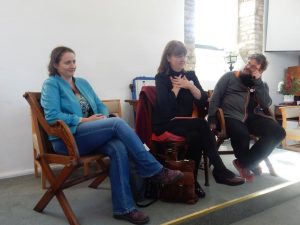
Joanna Penn, Orna Ross and Dan Holloway discussing How to Live a More Creative Life (Photo: Thomas Shepherd)
Satisfying the Audience
- Your festival is nothing without an audience, so aim to please yours and make them feel this is their festival, as well as the authors'.
- Ensure comfortable seating, lighting, sound (use microphones if you can and assume a certain percentage of your audience will be hearing impaired).
- Provide comfortable turnaround times between events – I have 50-minute events starting on the hour every hour, so there are ten minutes from them to move between venues, which are a couple of minutes walk apart.
- Ensure your authors keep to the timetable – all parties will be much more relaxed if no-one has to rush or leave an overrunning event to catch the next on their list.
- Provide clear directional signage – not everyone in your audience will know their way round your locale.
- Provide printed programmes on the day – they needn't be fancy, just an agenda so they know where to go when.
- Recruit volunteer marshalls and give them clear badges so people know who to ask if they're lost or confused.
- Brief those marshalls so they know what's what!
- Respect your audience – they are your festival's unofficial ambassadors and you want them to tell everyone afterwards how great it was and persuade them to come next time!
- Provide ample catering – simple teas, coffees, waters, at affordable prices will help oil their day, and if you can run to more, even better. (Our Alice in Wonderland Cafe with book-themed cakes and soups is one of our major sources of funding.)
- If you have local authors, or others who might serve as panel chairs, involve them – their local friends will come to see them and stay for at least part of the rest of the festival, and it also builds the feeling that this is truly a local festival.
- If there are other parts of the book trade who are willing to be involved, welcome them – e.g. we launched our second festival from the steps of the local mobile library
Building an Audience
- Promote the event in the most likely places to reach your audience. If it's a small local community like mine, this doesn't mean taking out paid ads or staging a busy social media campaign. Your local paper, library, tourist office or school may be more appropriate than something with global reach.
- However, you must have a website, even if it's only simple – online is where most people will look. Facebook events and Twitter profiles are useful but beware of taking on more than you can do – or else appoint a committee of volunteers each tasked with a key component of your publicity campaign.
- Try to build a mailing list (which I haven't really done yet for mine but it's on my to-do list) so you can reach people next time – and all year round as you book new authors or have other news to share
- Encourage authors to speak to the audience – they love meeting “real” authors, even those they haven't heard of. My mum was so touched when author Celia Boyd thanked her for buying one of her books, having spotted it by her cup of tea in the cafe, that when my mum got home, she ordered the rest of Celia's books from Amazon!
- Finally, word of mouth is the best recommendation, and ask them to tell their friends if they've enjoyed it.
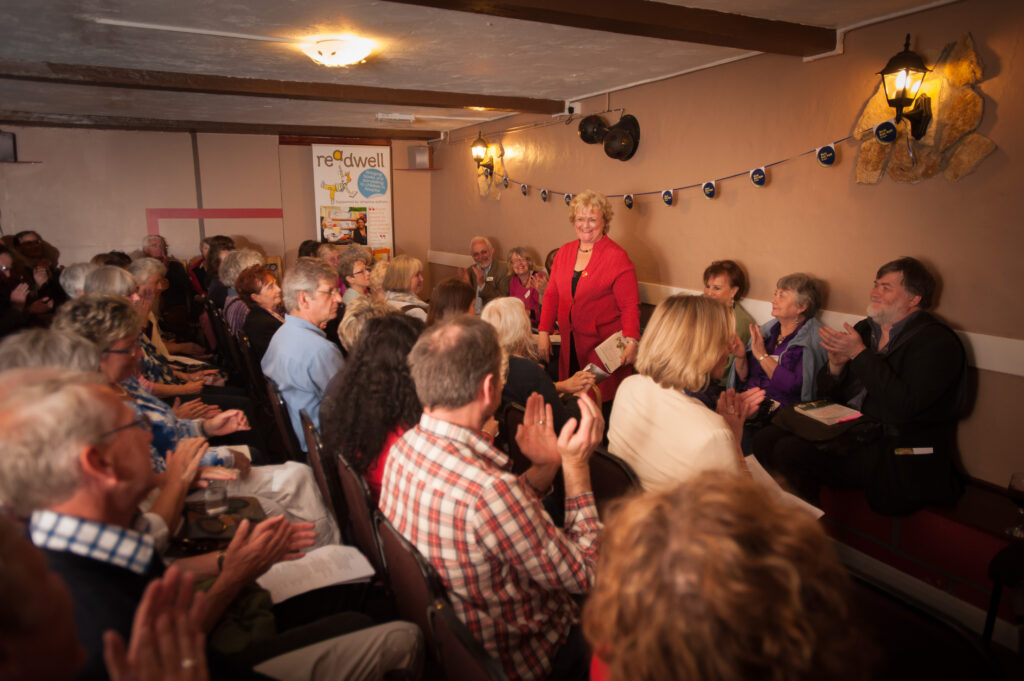
Authors and guests enjoying the first Hawkesbury Upton World Book Night Festival at The Foxx Inn, Hawkesbury Upton.
Picture by Clint Randall www.pixelprphotography.co.uk
Keeping the Momentum Going
- Most festivals will be annual, and a year is a long time to keep the momentum going, so try to do something each month to keep your festival in the public eye. I also tell myself “Festival Friday” so that i at least think of it once a week, even if I don't do anything about it!
- If there are other events going on in your locale, try to muscle in on their audience e.g. by taking a stall at a village fete or school fair. HULF now has a stall at the Hawkesbury Horticultural Show each August manned by half a dozen authors to promote the Festival while also selling their books.
- Update your website throughout the year (also on my to-do list is to add the photos and videos from this year's event).
- Mention it in your CV and at every opportunity. I'm lucky enough to be part of a monthy Book Club slot on BBC Radio Gloucestershire's lunchtime show, and the presenter always introduces me as “local author and director of the Hawkesbury Upton Literature Festival”!
- Be on the look-out for new talent all year round – you will certainly meet new authors who will give you ideas for new events.
- For the first festival, I self-published an anthology featuring a short piece by each author. This has been useful to demonstrate the breadth of the festival to people who haven't been there, but although useful for PR purposes, it hasn't sold many copies so I haven't done it for the last two events.
Financial Management
- Decide from the outset whether you are going to make this a free event or a chargeable one. If charging for admission, you should pay your author speakers a fee.
- Selling tickets is likely to diminish attendance – we have many people who go to multiple events or try events they're not sure they'll like, because there's no cost implication.
- Selling tickets and paying authors also provides an administrative responsibility and burden – appoint a trustworthy volunteer to manage that if you can, or it'll be a distraction.
- Even if you're running a free festival, set up a bank account, which will make it clear you are above board, and will also make you eligible for grants. We've only done that this year because last year we missed out on a grant from a local family's trust fund, which was a shame.
- Grants for small festivals are available if you look for them – and not only from literary funds. Our local supermarket Waitrose has twice made HULF a beneficiary of its “community matters” token scheme, giving us about £300 each time, covering facilities hire.
- When seeking favours from other parties e.g. venues, try to offer them benefit in kind. The Fox Inn doesn't charge us anything for using its space because the proprietors know they'll get bed and breakfast bookings and lots of extra restaurant and bar business. The two chapels that we use as venues are very glad to have more people setting foot inside than in a month of services. #winwin
- You don't have to spend a lot to make a festival happen. Call in favours and talents. When I needed a local image to promote the festival, my dad kindly painted a watercolour of the monument that is the icon of our village. Handwrite your signs – if they're a bit wonky (mea culpa), it just adds to the indie feel of the event. Source cheap things online – our author and volunteer badges are really popular, and the recipients are proud to wear them as acknowledgement of their status, which helps build goodwill and engage their continuing support.
Conclusions
When I set out to run that first evening in the Fox a few years ago, I thought we'd have a couple of hours of fun in the pub with a few author friends, might get a few villagers in to hear us, and that would be it. From the word go, I was overwhelmed by the support I've received not just from the community but from the authors too. Hawkesbury Upton Lit Fest is now an important and immovable part of my year, and although it's exhausting, the rewards I gain from it justify the demands. Here's a list of how I've benefited personally – although I should also point out that I make no financial gains at all, giving all my time as a volunteer:
- building relationships with author friends
- meeting new authors who seek out the festival
- appreciative feedback from members of my community, clearly proud for the village to take ownership of the Festival
- pleasure of seeing other authors grow (e.g. those who have never shared their work in public before blossom as they did so at Hawkesbury for the first time, going on to become huge advocates for the event)
- pleasure of seeing other authors work together and build relationships that continued long after the Festival was over e.g. Joy Thomas, Jo Allmond and Thomas Shepherd, from the Writing About Difference panel, have collaborated on a moving collection of poetry by and for carers called Silent Voices – that the Festival was a catalyst for this makes me enormously proud and grateful
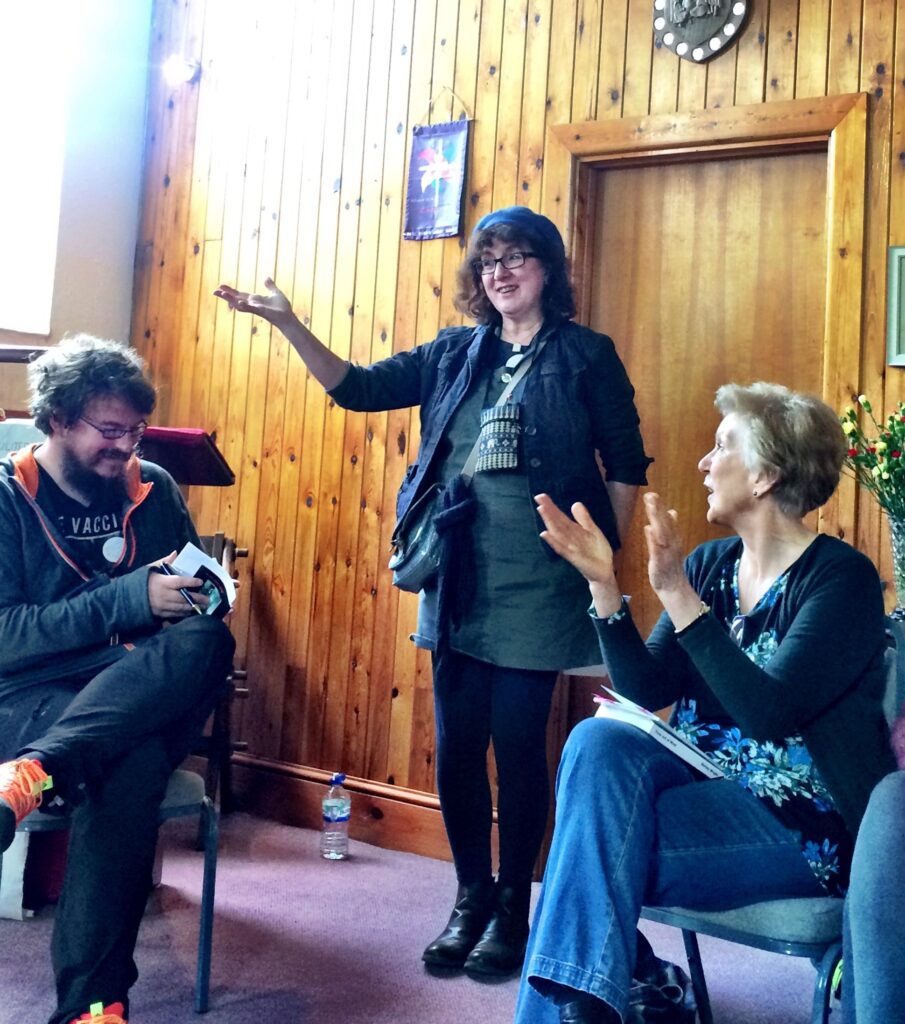
Paying tribute to Dan Holloway at the poetry readings in the Methodist Chapel (Photo: Joanna Penn)
Of course there are also selfish benefits that I have gained:
- a higher personal profile within my local community
- recognition from the author community that I've done something of value to the #PublishingOpenUp movement
- an easy launch platform for my books – I claimed organiser's perks this year and gave a shout-out for the first novel in my new Sophie Sayers Village Mysteries series, Best Murder in Show, which is set in a small English village not unlike Hawkesbury Upton featuring an aspiring writer and a local independent bookseller… I am surely going to have to write a lit fest into a future book in that series, and can consider my research already done!
For more information about the Hawkesbury Upton Literature Festival, visit www.hulitfest.com
For more information about the #PublishingOpenUp campaign, read ALLi's guidebook, Opening Up to Indie Authors.
#IndieAuthorFringe How to host An Inclusive Literary Festival @DebbieYoungBN http://bit.ly/2s9z2JC Share on XWhat questions or feedback do you have for Debbie Young? Leave her a comment below, or send her a Tweet using @DebbieYoungBN and our event hashtag #IndieAuthorFringe
GIVEAWAY
Enter to win a signed paperback copy of Debbie Young's fun cozy mystery Best Murder in Show, in which the central characters include an aspiring writer and an independent bookseller.

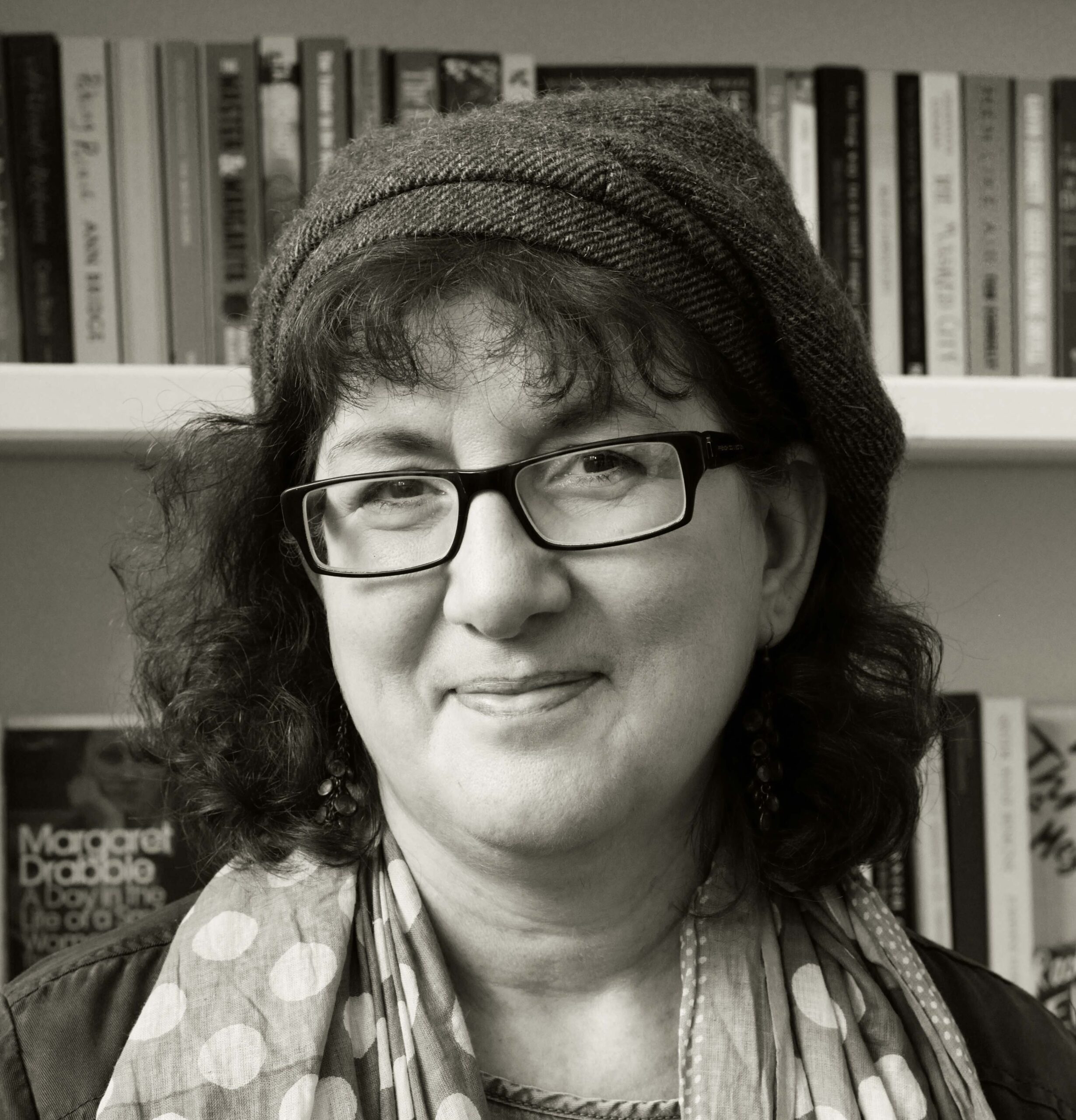



[…] How to Host An Inclusive Literary Festival: Debbie Young […]
[…] How to Host An Inclusive Literary Festival: Debbie Young […]
Helpful info for those of us who live in small towns far from a big city in the US. Like the idea of piggybacking on WBN.
Thanks, Janet, and so glad you found it useful. I reckon you can’t lose much by giving it a try in your own town as the financial outlay is minimal – it’s just a question of how much time and energy you are ready to invest. And there is much joy to be had in tailoring it for your own small town – one of the highlights for me of my 2017 Festival was having a local author give a reading from his book about the names commemorated village war memorial, standing right next to the memorial itself – something he’d never done before and much appreciated by the local community.
Great article. The idea of pulling together a festival is daunting, but the start small with a couple of speakers and build momentum is genius to create awareness in your local town. It is definitely something that I will consider as my local area has nothing dedicated outside of the library for author driven or encouraged events. Thank you for the step-by-step layout.
It’s a pleasure, Janice, and i’m glad to be able to share this model with others who can put it to good use around the world. I’m planning to write a short book with more detail soon, as there is much more I’d love to tell you about it! Good luck with planning an event for your area, and if you have any questions, please don’t hesitate to message me via my Festival website – I’ll be happy to advise.